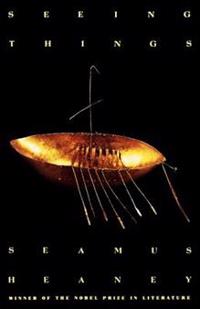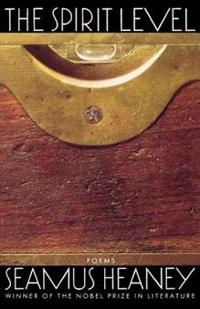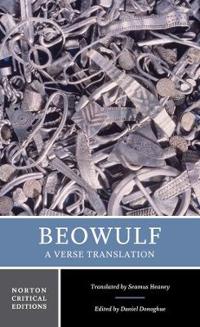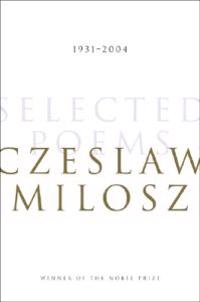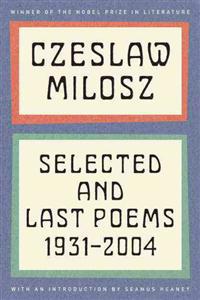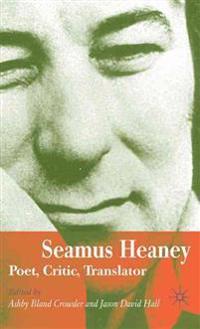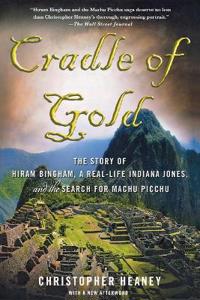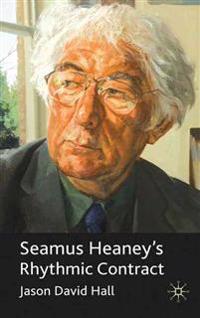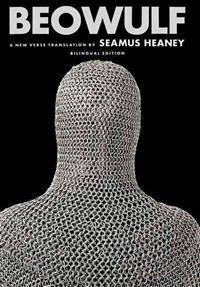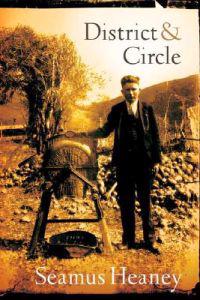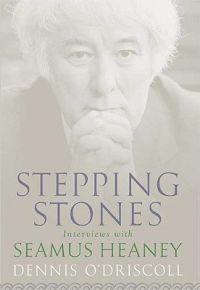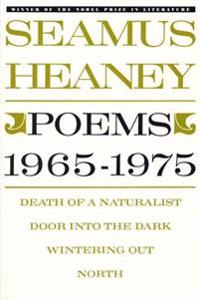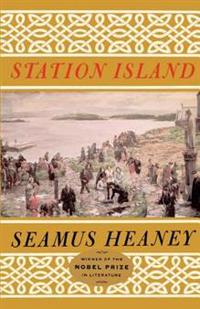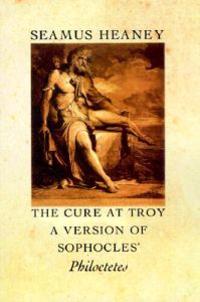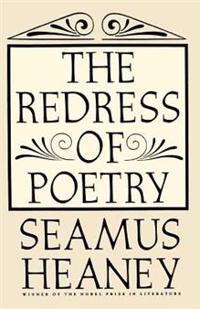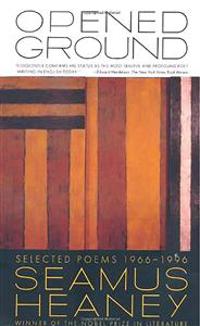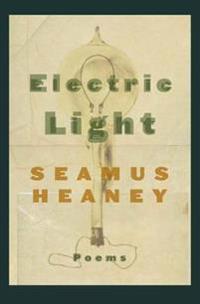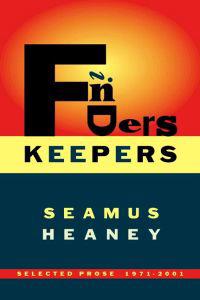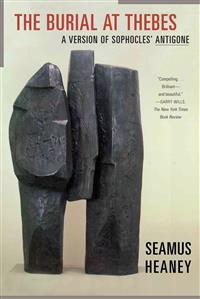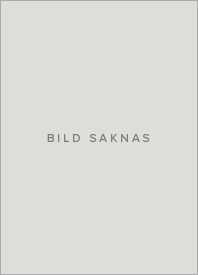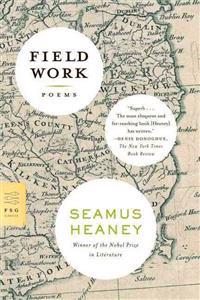Seamus Heaney (Okänt format)
avSeamus Heaney
ISBN: 9780571313181 - UTGIVEN: 2013-11Features stories such as: Death of a Naturalist; Door into the Dark; Wintering Out; North; Field Work; Station Island; The Haw Lantern; Seeing Things; The Spirit Level; Electric Light; District and Circle; Human Chain; and Beowulf.[...]
Seeing Things: Poems (Häftad)
avSeamus Heaney, Heaney
ISBN: 9780374523893 - UTGIVEN: 199304"Seeing Things (1991), as Edward Hirsch wrote in "The New York Times Book Review, "is a book of thresholds and crossings, of losses balanced by marvels, of casting and gathering and the hushed, contrary air between water and sky, earth and heaven." Along with translations from the "Aeneid and the "I[...]
The Spirit Level: Poems (Häftad)
avSeamus Heaney, Heaney Seamus
ISBN: 9780374525118 - UTGIVEN: 199704"The Spirit Level was the first book of poems Heaney published after winning the Nobel Prize in Literature in 1995. Reviewing this book in "The New York Times Book Review, Richard Tillinghast noted that Heaney "has been and is here for good . . . [His poems] will last. Anyone who reads poetry has re[...]
Beowulf (Pocket)
avDaniel Donoghue, Seamus Heaney, Seamus Heaney
ISBN: 9780393975802 - UTGIVEN: 200112This text presents a faithful rendition of "Beowulf", a poem written in Old English sometime before the tenth century A.D., which describes the adventures of a great Scandinavian warrior of the sixth century. The translation is combined with detailed annotations, with no reading knowledge of Old Eng[...]
Difficult Asthma (Pocket)
avLiam G. Heaney, Andrew Menzies-Gow, Liam G. Heaney
ISBN: 9789350902998 - UTGIVEN: 2013-06Most patients with asthma are easily diagnosed and treated with the use of an inhaler or medication. Approximately five per cent of people that suffer from asthma have 'difficult' or 'refractory' asthma, whereby they experience persistent problems that are not controlled by standard treatment metho[...]
Selected Poems 1931-2004 (Inbunden)
avCzeslaw Milosz, Seamus Heaney
ISBN: 9780060188672 - UTGIVEN: 200604A compelling compendium of poetry by the Nobel Prize-winning poet represents a definitive overview of the work of the seminal author of Second Space, Facing the River, and other works.[...]
Czeslaw Milosz: Selected and Last Poems, 1931-2004 (Häftad)
avCzeslaw Milosz, Seamus Heaney
ISBN: 9780062095886 - UTGIVEN: 2011-11The long-awaited paperback edition of Selected Poems, revised and updated with more than forty new poems never before published in English2011 marks the centenary year of one of the twentieth century's most important poets, Nobel laureate Czeslaw Milosz. To mark the occasion, Anthony Milosz has tran[...]
Seamus Heaney (Inbunden)
avAshby Bland Crowder
ISBN: 9780230003422 - UTGIVEN: 200704Seamus Heaney: Poet, Critic, Translator explores the range of Heaney's writing, emphasizing significant intersections in his work - meeting places; spaces between; tradition meeting the contemporary context as life meets death; liminal poetic representations and political divisions; town and woods, [...]
Cradle of Gold: The Story of Hiram Bingham, a Real-Life Indiana Jones, and the Search for Machu Picchu (Häftad)
avChristopher Heaney
ISBN: 9780230112049 - UTGIVEN: 201107In 1911, a young Peruvian boy led an American explorer and Yale historian named Hiram Bingham into the ancient Incan citadel of Machu Picchu. Hidden amidst the breathtaking heights of the Andes, this settlement of temples, tombs and palaces was the Incas' greatest achievement. Tall, handsome, and su[...]
Seamus Heaney's Rhythmic Contract (Inbunden)
ISBN: 9780230574885 - UTGIVEN: 200911While glosses on Seamus Heaney's verse forms figure more or less significantly in critical accounts of his poetry, Seamus Heaney's Rhythmic Contract is the first book to take the craft of Heaney's art of its focus. Setting out a historically informed approach to poetic form, the book places Heaney's[...]
Beowulf: A New Verse Translation (Inbunden)
avSeamus Heaney
ISBN: 9780374111199 - UTGIVEN: 200002Composed toward the end of the first millennium of our era, Beowulf is the elegiac narrative of the adventures of Beowulf, a Scandinavian hero who saves the Danes from the seemingly invincible monster Grendel and, later, from Grendel's mother. He then returns to his own country and dies in old age i[...]
Stepping Stones: Interviews with Seamus Heaney (Inbunden)
avDennis O'Driscoll
ISBN: 9780374269838 - UTGIVEN: 200812Widely regarded as the finest poet of his generation, Seamus Heaney is the subject of numerous critical studies, but no book-length portrait has appeared before now. Through his own lively and eloquent reminiscences, "Stepping Stones "retraces the poet's steps from his first exploratory testing of t[...]
Preoccupations: Selected Prose, 1968-1978 (Pocket)
avHeaney, Seamus
ISBN: 9780374516505Nobel laureate Seamus Heaney's first collection of prose, "Preoccupations," begins with a vivid account of his early years on his father's farm in Northern Ireland and his coming of age as a student and teacher in Belfast. Subsequent essays include critical work on Gerard Manley Hopkins, William Wor[...]
Poems, 1965-1975 (Häftad)
avSeamus Heaney
ISBN: 9780374516529 - UTGIVEN: 198110This volume gathers nearly all of the poems from Heaney's first four collections: "Death of a Naturalist (1966), "Door into the Dark (1969), "Wintering Out (1972), and "North (1975).
[...]Station Island (Häftad)
avSeamus Heaney
ISBN: 9780374519353 - UTGIVEN: 198601The title poem of this collection, set on an Irish island, tells of a pilgrim on an inner journey that leads him back into the world that formed him, and then forward to face the crises of the present. Writing in The Washington Post Book World, Hugh Kenner called this narrative sequence "as fine a l[...]
The Cure at Troy: A Version of Sophocles' Philoctetes (Häftad)
avSeamus Heaney
ISBN: 9780374522896 - UTGIVEN: 1991-12"The Cure at Troy" is Seamus Heaney's version of Sophocles' "Philoctetes." Written in the fifth century BC, this play concerns the predicament of the outcast hero, Philoctetes, whom the Greeks marooned on the island of Lemnos and forgot about until the closing stages of the Siege of Troy. Abandoned [...]
The Redress of Poetry (Häftad)
avSeamus Heaney
ISBN: 9780374524883 - UTGIVEN: 199610Seamus Heaney defines the title of this work of criticism as follows: "To redress poetry is to know and celebrate it for its forcibleness as itself . . . not only as a matter of profferd argument and edifying content but as a matter of angelic potential, a motion of the soul." Throughout this collec[...]
Opened Ground: Selected Poems, 1966-1996 (Häftad)
avSeamus Heaney
ISBN: 9780374526788 - UTGIVEN: 199910A definitive choice of the Nobel Laureate's best poems. You are neither here nor there,
A hurry through which known and strange things pass
As big soft buffetings come at the car sideways
And catch the heart off guard and blow it open.
-from "Postscript" Noted for its concreteness an[...]Electric Light: Poems (Häftad)
avSeamus Heaney
ISBN: 9780374528416 - UTGIVEN: 200204In the finland of perch, the fenland of alder, on airThat is water, on carpets of Bann stream, on hold
In the everything flows and steady go of the world.
—from "Perch" Seamus Heaney's new collection travels widely in time and space, visiting the sites of the classical world a[...]Finders Keepers: Selected Prose 1971-2001 (Häftad)
avSeamus Heaney
ISBN: 9780374528782 - UTGIVEN: 200304Delving into his literary heritage and his own voice in the modern world, this current collection contains the Nobel Prize winner's greatest lectures, short newspaper articles, radio commentaries, and other richly textured pieces. Reprint.[...]
The Burial at Thebes: A Version of Sophocles' Antigone (Häftad)
avSeamus Heaney
ISBN: 9780374530075 - UTGIVEN: 200511In this outstanding new translation, commissioned by Ireland's renowned Abbey Theatre to commemorate its centenary, Seamus Heaney exposes the darkness and the humanity in Sophocles' masterpiece, and inks it with his own modern and masterly touch.[...]
District and Circle: Poems (Häftad)
avSeamus Heaney
ISBN: 9780374530815 - UTGIVEN: 2007-04Seamus Heaney's new collection starts "In an age of bare hands and cast iron" and ends as "The automatic lock / clunks shut" in the eerie new conditions of a menaced twenty-first century. In their haunted, almost visionary clarity, the poems assay the weight and worth of what has been held in the ha[...]
Stepping Stones: Interviews with Seamus Heaney (Häftad)
avDennis O'Driscoll
ISBN: 9780374531935 - UTGIVEN: 2010-03


